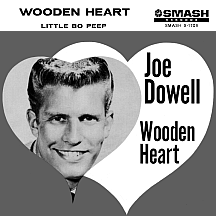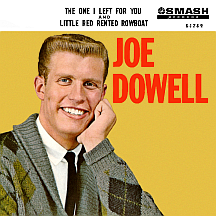JOE DOWELL
Wooden Heart
Not all singers can honestly say they like the songs they're best-known for. Joe Dowell felt that way. A singer-songwriter from Bloomington, Indiana who grew up in Bloomington, Illinois (as a result of his dad's career path), Joe made it all the way to number one on the U.S. charts in 1961 with an updated version of a song from the 1820s by popular German composer Friedrich Silcher that, after some lyrical/musical revision by big band-era songwriter Kay Twomey with Fred Wise and Ben Weisman (regular contributors to Elvis Presley's repertoire) and German bandleader Bert Kaempfert, became "Wooden Heart" (the original title, "Muss I Denn," loosely/oddly translates as "Do I have to?," Joe's likely reaction when the song was suggested to him). In a desperate pursuit of success, he recorded it despite his better judgment.
Harry Dowell died of a heart attack when Joe was ten years old. The youngster dealt with the loss of his father by writing songs, usually dealing with themes of sadness/loneliness. At age 13 he bought a cheap Stella guitar from a friend and within a year had entered a local amateur talent show. He sang with choral groups during high school and in 1956, at age 16, became obsessed with Elvis and all things rock and roll, dreaming of someday having a hit record. Leaving home in 1958, he attended the University of Illinois, majoring in radio/television while performing regularly (with a much nicer Gibson acoustic guitar his mother had bought for him) at campus fraternities/sororities. In the fall of 1960, he was hired to perform at the Hoopeston, Illinois Sweet Corn Festival (started in 1938, it continues to be a yearly event), opening for country singers Loretta Lynn, Billy Grammer and teen idol George Hamilton IV, all complimentary of his talent. Suddenly, the goal of making hit records seemed more attainable.
A few months later, during the 1961 spring break, Joe and a friend drove/lived in a Volkswagen Bug, headed to Nashville, and spent the entire week hitting up as many record labels and/or talent agents as possible. Along the way, Joe met Grand Ole Opry regulars The Wilburn Brothers, who liked his style and got him in to see Shelby Singleton of Mercury Records...who offered him a contract on-the-spot! A month later he was in the studio for his first recording session, telling everyone within earshot he was going to have a number one hit on the first try (many Music City pros joked, behind his back, about the kid with the "big ego"). The idea was to dazzle them with some of the songs he'd written, but Singleton had a more surefire plan...one that made his boasting a reality.
Presley's G.I. Blues soundtrack had been released the previous September, several weeks ahead of the film's theatrical premiere. "Wooden Heart" (with English and German lyrics) was performed onscreen by Elvis in a puppet show setting as he charmed costar Juliet Prowse and a group of children. A single release (with a simple accordion/tuba arrangement) became a huge international hit, reaching number one in several countries in the spring of '61, though it was bypassed in the U.S. (RCA Victor had already decided to promote tougher-sounding singles like "I Feel So Bad" and "Little Sister" so as not to stray too far from his pre-Army rock roots). When Shelby pressured Dowell to do the song, the young singer bristled; the last thing he wanted to record was some corny cover! Singleton hired a German dialect specialist to coach him and used a top-notch team of Nashville musicians including Mercury recording artist Ray Stevens, who played the accordion part on organ, while a bass guitar replaced the tuba. With any luck, Joe figured, the song would soon be forgotten.
But Mercury's A&R department had plannned all along to release "Wooden Heart" on the company's recently-revived Smash label. Every radio station that played it got immediate response; Joe was set up with an independent promotion rep, who drove him to dozens of cities over a monthlong blitz (battling a version by former Dell-Vikings member Gus Backus that was already breaking in Minneapolis and Chicago). Joe performed the song at some record hops while numerous station visits gained him loads of airplay...and listeners loved it. He was booked to open for Pat Boone, Bobby Rydell and others and at the end of August the single hit number one on the national charts. Answer songs popped up ("You Don't Have a Wooden Heart" by Linda Hall, "I Too Have No Wooden Heart" by Rhea Renee) and for a brief time, Joe Dowell was a star.
Top 50 follow-up "The Bridge of Love" (penned by Wise and Weisman) sounded just like its lead-in, complete with a set of German lyrics. Joe wasn't happy with the way this was going, but they did throw him a bone: his original composition "Just Love Me" was on the flip side. He figured the cycle/torture would soon end. But the third single, November release "A Kiss for Christmas (O Tannenbaum)," complied with the formula. Jack Keller-Larry Kolber composition "The Thorn on the Rose" was, in Dowell's mind, a little more palatable, but stiffed on arrival. Joe was pleased when "The One I Left For You," a song he considered among the best he'd written, appeared to be the next A side; copies of the picture sleeve listed it first. But some printings didn't. The actual plug side was "Little Red Rented Rowboat," a cute novelty ditty ('...not much better than no boat...') that...well...at least Marvin Moore and Bernie Wayne hadn't written any foreign language lyrics for it. Again, Joe's reaction was "Ugh!," but then in August 1962 it reached the top 30, which bought him a little more time. None of the final three singles on Smash found acceptance (Dowell-penned "Our School Days" was one of the B sides, anyway) and by the summer of 1963 he and Mercury/Smash had parted ways.
Much to his chargin, the next few years were uneventful. In 1966 his friend Ray Stevens, recording at the time for the Monument label, got him in the door for one single; both sides, "If I Could Find Out What is Wrong" and "Indian Summer Days," were songs Joe had written. Afterwards he shifted gears and began singing jingles for television/radio commercials in various regions of the U.S. By the end of the decade he had dozens of clients and was making a good living. That long-gone hit song turned out to be a gift that kept on giving; nearly everyone knew it, which opened a lot of doors. In the 1970s, Joe Dowell made recordings for banks, power companies and the Boy Scouts of America, in addition to several spiritual songs for independent record labels. Despite his personal feelings about "Wooden Heart," it sparked a lifetime career.



